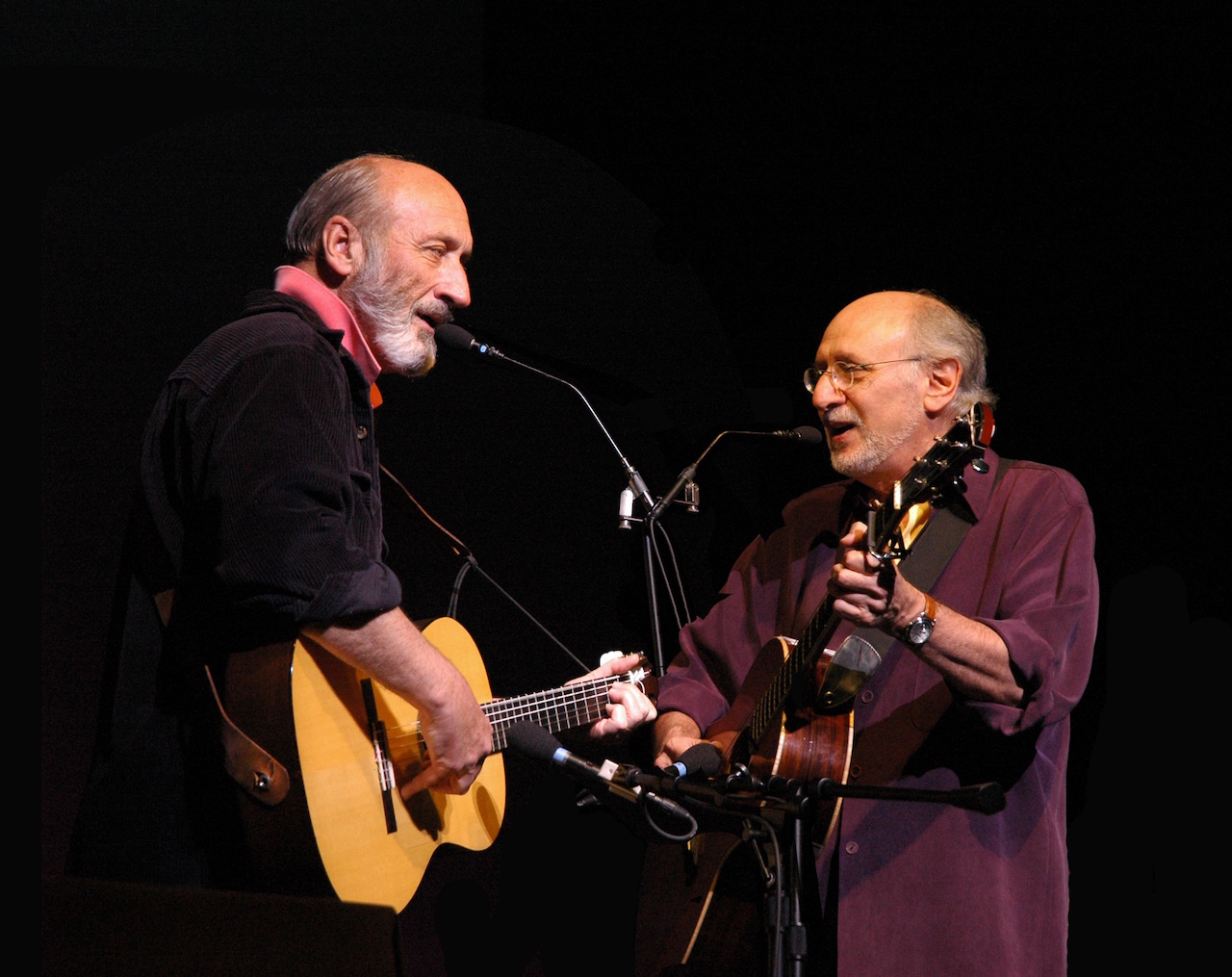The Local newsletter is your free, daily guide to life in Colorado. For locals, by locals.
One of my first memories is at a Peter, Paul and Mary concert. I was four or five years old, and my mom had toted me along to see one of her favorite groups. I know I clapped and danced to the folk tunes, spinning around to the delight of everyone in the vicinity. I don’t really remember the music.
In the years following, though, I became enamored with the grassroots emotion these songs stirred up and the way it embodied the social justice movements of the ’60s and ’70s. I’m not alone. Decades after they were first released, tracks such as “Leaving on a Jet Plane” and “The Times They Are A’Changin’” still resonate with listeners, so much so that Peter Yarrow and Noel Paul Stookey continue to tour (even after Mary Travers passed away in 2009). I chatted with Yarrow in advance of the duo’s stop at the Paramount Theatre on Friday to talk about his favorite songs, his most memorable performance, and why ’60s folk music still has an audience today.

5280: Why do you think your music has continued to resonate with audiences after more than 50 years?
Peter Yarrow: It’s the same reason that folk music in general does—it’s the reason that Pete Seeger, even at the age of 94, was resonating with multiple generations, why Woody Guthrie is being celebrated today. Folk music has a certain kind of intrinsic honesty, the authenticity that I believe people crave today. It’s not just about teenage angst, it’s really about hopes and dreams and aspirations and the telling of the stories of its times—particularly now when there is a hunger for authenticity and for substance.
What’s your most memorable performance?
Unquestionably, the March on Washington [for Jobs and Freedom] in ’63. It wasn’t a performance in the sense that we were getting on stage and saying, ‘Look what we can do.’ Whether it was that march or the [Selma to Montgomery] march, or the march in 1969 with half a million people that I co-organized, there was never a sense that we were doing anything other than conveying the political message. People were not taking a break from the speeches to be entertained—we were conveying the message directly in our music.
Do you think you would have had as much success if you were making music at a time other than the ’60s and ’70s?
I think that Peter, Paul and Mary might have had a great deal of success if we had not been political, but I don’t think we would have had the same meaning historically. We were putting our bodies out there, sometimes in danger, and certainly subject to criticism from those who felt that we were seditious or anti-American or Commies or Pinkos or whatever. We had a lot at stake, so we had the ability to weather the challenges of being a group or a trio. We never used the term ‘band’ because it hadn’t yet come into current usage. We were a folk trio, we were folk singers, but a band we never were.
You wrote some of Peter, Paul and Mary’s biggest hits, including co-writing “Puff the Magic Dragon.” What’s your writing process like?
Each song has its own life and trajectory—some songs emerge full-blown, others are agony. Writing a song requires to a certain degree kind of going into another zone; until I’m there, it’s cerebral, but then there’s something else that kind of leads the process.
What are your favorite Peter, Paul and Mary songs?
The ones that are really my favorites are not necessarily the ones that are the most popular, like “Sweet Survivor.” “The Great Mandela” is one of the best songs I’ve written. It’s delightful to sing because when I sing it, everybody’s having a wonderful time; everyone’s having a moment of reflection or sadness or reminiscence. What I love that I’ve done or am most proud of are those things that took me on a journey that really was meaningful to me in terms of their own creation rather than the viewpoint of the way in which they were accepted by the audience.
Has the style of your music changed since you went out on your own?
It’s very much the same, absolutely. When I perform with Noel Paul Stookey, you might think people would say, ‘Oh, where’s Mary?” That’s not the case when I sing “Blowin’ in the Wind” or “Leaving on a Jet Plane” or “If I Had a Hammer.” Hearing a rendition of a song has its own value. Of course, Mary is missed—she’s missed by me, she’s missed by Noel Paul, she’s missed by the audience. But the good news is that the music continues. When I’m singing alone, I bring kids on stage to sing “Puff the Magic Dragon,” and they know it at the age of three. It’s remarkable.
Does Colorado have any particular significance for you?
Someone said, ‘They want you to do a concert in Colorado,’ and we said, ‘Yes, we’d love to do that.’ But I have a very fond relationship to Colorado because I have a place in Telluride that’s my getaway. I adore it.
What can people expect to hear at the Paramount Theatre show?
The repertoire that we’re singing—with the exception of songs that Noel will sing in his solo—is precisely the Peter, Paul and Mary repertoire. To me, that’s also what I sing when I solo. He focuses almost exclusively on the songs he’s written post-Mary’s passing. For him, that’s a step forward. For me, this music that I’ve done for all these decades is what I want to sing. I enjoy singing it alone. I enjoy singing it with Noel. And it’s going to be a joyous event.
Follow editorial assistant Mary Clare Fischer on Twitter at @mc_fischer.








